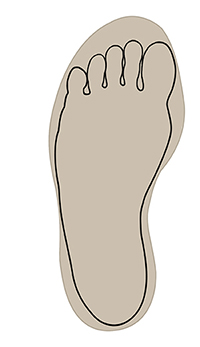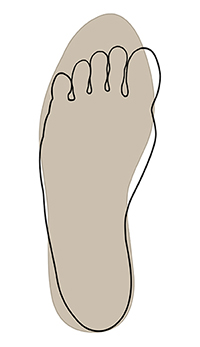A
B
C
D
E
F
G
H
I
J
K
L
M
N
O
P
Q
R
S
T
U
V
W
X
Y
Z
Click a letter to see a list of medical procedures beginning with that letter.
Click 'Back to Intro' to return to the beginning of this section.
Choosing the Right Shoes for Comfort
You walk on your feet every day, forcing them to support the weight of your body. Repeated stress on your feet can cause damage over time. The right shoes can help protect your feet. The wrong shoes can cause more foot problems. Read the information below to help you find a shoe that fits your foot needs.
|

|

|
|
A good shoe fit will cover your foot outline.
|
A shoe that doesn’t cover the outline is a bad fit.
|
What’s your foot shape?
To get a good fit, you need to know the shape of your foot. Do this simple test: While standing, place your foot on a piece of paper and trace around it. Is your foot straight or curved? Do you have a foot problem, such as a bunion, that causes your foot outline to show a bulge on the side of your big toe?
Finding your fit
Bring your foot outline to a shoe store to help you find the right shoe. Place a shoe you like on top of the outline. The shoe should match the shape of the outline. If you have a bunion, the shoe may not cover the bulge on the outline. Look for soft leather shoes to stretch over the bunion. Once you’ve found a pair of shoes that match the outline, put them on. Walk around the store several times. Make sure the shoes don’t rub or pinch. If the shoes feel good, you’ve found your fit.
The right shoe for you
A good shoe has features that provide comfort and support. It must also be the right size and shape for your feet. Look for a shoe made of breathable fabric and lining, such as leather or canvas. Make sure that the shoes have enough tread to prevent slipping. Go to a good shoe store for help finding the right shoe.
Good shoe features
An ideal shoe has:
-
Laces, hook-and-loop fasteners, or buckles for support
-
A front of the shoe (toe box) with ½ inch space in front of your longest toes
-
An arch shape that supports your foot
-
No more than 1½ inches of heel
-
A stiff, snug back to keep your foot from sliding around
-
A smooth lining with no rough seams
Shoe shopping tips
Below are some do’s and don’ts for when you go to the shoe store.
Do:
-
Select the shoes that feel right. Wear them around the house. Then bring them to your foot healthcare provider to check for fit. If they don’t fit well, return them.
-
Shop late in the day, when your feet will be slightly bigger.
-
Each time you buy shoes, have both your feet measured while you are standing. Foot size changes with time.
-
Pick shoes to suit their purpose. High heels are OK for an occasional night on the town. But for everyday wear, choose a more sensible shoe.
-
Try on shoes while wearing any inserts specially made for your feet (orthoses).
-
Try on both the right and left shoes. If your feet are different sizes, pick a pair that fits the larger foot.
Don’t:
-
Don’t buy shoes based on shoe size alone. Always try on shoes, as sizes differ from brand to brand and within brands.
-
Don’t expect shoes to “break in.” If they don’t fit at the store, don’t buy them.
-
Don’t buy a shoe that doesn’t match your foot shape.
What about socks?
Always wear socks with shoes. Socks help absorb sweat and reduce friction and blistering. When shopping for shoes, wear soft, padded socks with seams that don’t irritate your feet.
If you have foot problems
Some foot problems cause deformities. This can make it hard to find a good fit. Look for shoes made of soft leather to stretch over the deformity. If you have bunions, buy shoes with a wider toe box. To fit hammertoes, look for shoes with a tall toe box. If you have arch problems, you may need inserts. In some cases, you’ll need to have custom footwear or orthoses made for your feet.
Ask your healthcare provider
Talk with your healthcare provider about what kind of footwear you need. They may advise a certain brand or shoe store.
Online Medical Reviewer:
Raymond Turley Jr PA-C
Online Medical Reviewer:
Stacey Wojcik MBA BSN RN
Online Medical Reviewer:
Thomas N Joseph MD
Date Last Reviewed:
10/1/2022
© 2000-2024 The StayWell Company, LLC. All rights reserved. This information is not intended as a substitute for professional medical care. Always follow your healthcare professional's instructions.